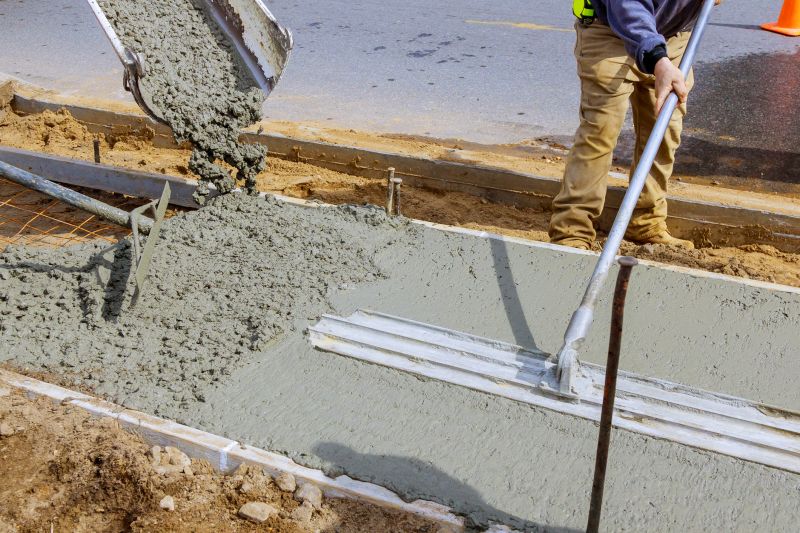Ultimate Guide To Concrete Installation Product Essentials
Learn about the key tools and materials that are vital for successful and professional concrete installation outcomes.
 Concrete installations are fundamental to a wide range of projects, from residential driveways and patios to commercial flooring and structural foundations. Achieving durable and precise results requires the right selection of products tailored to specific needs and conditions. Whether you're engaging in a small DIY project or overseeing a large-scale construction, understanding the available products for concrete installations can help ensure a smooth process and a successful outcome.
Concrete installations are fundamental to a wide range of projects, from residential driveways and patios to commercial flooring and structural foundations. Achieving durable and precise results requires the right selection of products tailored to specific needs and conditions. Whether you're engaging in a small DIY project or overseeing a large-scale construction, understanding the available products for concrete installations can help ensure a smooth process and a successful outcome.
Top Overall Option
Concrete Mixing and Curing Compound
A versatile concrete mixing and curing compound can be an essential component for achieving consistent mixes and optimal curing conditions. These products help improve workability during mixing, reduce surface cracking, and promote proper hydration, leading to durable and smooth concrete surfaces. Choosing a high-quality compound suitable for your specific project size and environmental conditions can support better results and longer-lasting installations.
Types of Products For Concrete Installations
Concrete Mixes
Pre-mixed or custom-blended concrete for various applications, offering convenience and consistency.
Reinforcement Materials
Rebar, wire mesh, and fiber reinforcement to enhance concrete strength and crack resistance.
Formwork and Molds
Temporary or permanent molds used to shape and support concrete during setting.
Surface Finishing Tools
Tools such as trowels, floats, and edgers for achieving desired surface textures and finishes.
Admixtures
Chemical additives that modify properties like setting time, workability, and durability.
Curing Compounds
Products applied to retain moisture and promote proper curing of concrete surfaces.
Sealants and Waterproofers
Protective coatings to prevent water ingress and surface deterioration.
Concrete Vibrators
Tools used to eliminate air bubbles and ensure proper compaction of concrete.
Expansion Joints
Materials that allow for movement within concrete slabs to prevent cracking.
Anchors and Fasteners
Devices for securing fixtures and structural elements to concrete surfaces.
Concrete Repair Products
Patch and filler compounds designed to restore damaged or cracked concrete.
Surface Texturing Tools
Tools and products used to create slip-resistant or decorative surface finishes.
Concrete Dyes and Colorants
Products for adding color and aesthetic appeal to finished concrete surfaces.
Form Release Agents
Coatings that facilitate easy removal of molds and prevent sticking.
Grinding and Polishing Equipment
Tools for refining and polishing concrete surfaces for a smooth finish.
Popular Choices
Ready-mixed concrete options are frequently used for their convenience and consistency.
Common reinforcement materials to strengthen concrete structures.
Reusable or disposable molds for shaping concrete during setting.
Popular tools like trowels and floats for achieving smooth finishes.
Widely used to modify concrete properties for specific project needs.
Frequently chosen to maintain moisture during curing, especially in dry conditions.
Commonly selected for protecting concrete surfaces from water damage.
Popular for ensuring proper concrete compaction and eliminating air pockets.
Often incorporated to accommodate movement and prevent cracking.
Essential for securing fixtures and structural components.
Frequently used for maintenance and fixing surface imperfections.
Popular for decorative concrete projects.
Commonly applied to facilitate mold removal and surface quality.
In Colorado Springs, CO, where varying weather conditions and soil types can influence construction projects, choosing appropriate concrete products is especially important. Proper tools and materials can improve the quality of your work, enhance safety, and extend the longevity of the finished installation. From curing compounds to reinforcement materials, there is a broad spectrum of products designed to support different aspects of concrete work.
Investing in high-quality products can also streamline your workflow, minimize errors, and reduce the need for rework. It's essential to consider factors such as compatibility with existing materials, ease of use, and suitability for the specific application. With the right products, you can achieve a professional-looking, durable concrete surface that meets your project requirements.
This guide provides an overview of the most important product categories for concrete installations, highlighting popular options and key considerations to keep in mind during your purchasing process. Whether you're working on a small backyard project or a larger commercial endeavor in Colorado Springs, selecting the appropriate products is a crucial step toward successful concrete work.
Key Buying Considerations
- Compatibility with existing materials and project specifications
- Environmental conditions in Colorado Springs, such as temperature and humidity
- Ease of use and application methods suitable for your skill level
- Durability and long-term performance expectations
- Type and size of reinforcement needed for structural integrity
- Curing time and methods to ensure proper hydration
- Surface finish requirements, including texture and slip resistance
- Budget constraints and cost-effectiveness of products
- Availability of replacement parts or additional supplies
- Manufacturer reputation and product reviews
- Application-specific features, such as waterproofing or coloring
- Safety considerations during handling and application
- Environmental impact, if relevant to your project scope
- Compatibility with other products or tools you plan to use
- Local climate considerations affecting curing and setting
